Old Rape Case Clouds Director Nate Parker’s New ‘Birth of a Nation’
As the publicity machine gears up for the release of the bold reimagining of the 1915 classic, a case involving Parker, who also stars, and co-writer Jean Celestin from their college days has been getting attention.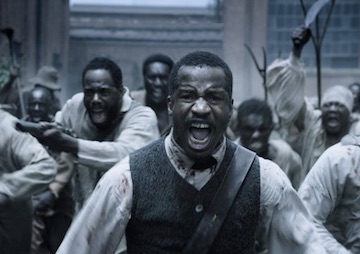
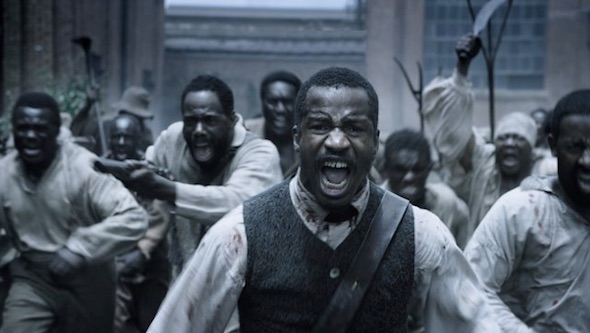
Still image from Nate Parker’s “The Birth of a Nation.” (IMDb)
Director Nate Parker has encountered a serious roadblock in the rollout phase of his forceful big-screen debut, “The Birth of a Nation.” So serious, in fact, that it could throw the film’s prospects into question.
The issue lies not with the film itself, although the film’s bold treatment of the 1831 Virginia slave rebellion led by Nat Turner has already drawn plenty of press, along with critical acclaim and early success. The movie was snapped up for a record $17.5 million after making a stunning first impression at the Sundance Film Festival in January. Truthdig’s own Sarah Wesley caught a June 1 screening at the Los Angeles Film Festival and also came away strongly affected.
Nor is it about Parker’s provocative choice to repurpose the title of D.W. Griffith’s infamously racist 1915 film — a cinematic promotional tool for the Ku Klux Klan — for his uncompromising take on America’s sinister past and slated to hit theaters a century later, during a time of agonizing national tension around race relations.
Instead, the controversy stems from Parker’s own personal history. Last week, Variety reported that a 1999 incident had resurfaced involving Parker and the film’s co-writer, Jean Celestin, when they were attending Penn State. Here’s a brief synopsis of the details as reported in Tuesday’s New York Times:
Mr. Parker was accused in 1999 of raping a fellow student at Penn State. The victim, whose name is not public, said that Mr. Parker and his roommate, Mr. Celestin, raped her while she was intoxicated and unconscious, according to court documents, and that they later harassed, intimidated and stalked her after she pressed charges. Both men said that the sex was consensual.
Mr. Parker, who, according to court transcripts, had had consensual oral sex with the woman previously, was acquitted of the charges. Mr. Celestin, who received a “story by” credit on “The Birth of a Nation,” was convicted of sexual assault, but his case was appealed. There are conflicting accounts about the outcome.
The woman, under the name Jane Doe, then sued Penn State for failing to protect her from harassment; the case was settled for $17,500. According to court records, the victim had twice attempted suicide after the alleged rape. According to a court document, as a result of the harassment, the accuser “suffered severe depression, sleeplessness, and anxiety attacks.” She also said that her apartment had been broken into and that her files on the case had been “disturbed.”
Parker eventually left Penn State to finish his studies at the University of Oklahoma. On Tuesday, however, Variety again filed a story about the case, this time including input from the victim’s brother, Johnny, who told the trade publication that his sister had committed suicide in 2012, at age 30:
Her older brother told Variety that she committed suicide and overdosed on sleeping pills. “She became detached from reality,” the woman’s brother, Johnny, told Variety, asking not to use his last name to honor his sister’s wishes to remain anonymous. “The progression was very quick and she took her life.”
The news comes just days after Parker gave interviews last week to Variety and Deadline about being charged with rape as a student at Penn State. He was acquitted in a 2001 trial, but questions about the case persist.
“He may have litigated out of any kind of situation,” Johnny said. “My position is he got off on a technicality.” Other family members reached by Variety declined to publicly comment.
There’s no evidence that the woman’s death was directly linked to the trial. She died at a drug rehabilitation facility, where she was found unresponsive by staff with two 100-count pill bottles of an over-the-counter sleep aid with ingredients similar to Benadryl by her side.
Johnny also told Variety that Parker should receive scrutiny about his background because of the nature of his film — for which the director, who also produced and stars in the film as Nat Turner, is scheduled to conduct a speaking tour to discuss social injustice. “His character should be under a microscope because of this incident,” Johnny said, adding that “there’s a moral and ethical stance you would expect from someone with regard to this movie.”
Though the woman’s family released a statement to The New York Times saying they did not wish to take part in “stoking” publicity about the story, another of her siblings came forward with a more specific comment, printed in the same NYT article:
But the woman’s sister, Sharon Loeffler, said that statement did not represent the sentiments of other family members or the woman herself. “I know what she would’ve said,” Ms. Loeffler said, “and that would be, ‘I fought long and hard, it overcame me. All I can ask is any other victims to come forward, and not let this kind of tolerance to go on anymore.’” Ms. Loeffler said her sister had believed there were other victims and had been broken by the 1999 case and its aftermath. “These guys sucked the soul and life out of her.”
On Tuesday evening, Parker spoke up with his own statement, released via Facebook, in which he said he was “filled with profound sorrow” when he heard the news of the woman’s death. Here’s more from his post:
I can’t tell you how hard it is to hear this news. I can’t help but think of all the implications this has for her family.
I cannot- nor do I want to ignore the pain she endured during and following our trial. While I maintain my innocence that the encounter was unambiguously consensual, there are things more important than the law. There is morality; no one who calls himself a man of faith should even be in that situation. As a 36-year-old father of daughters and person of faith, I look back on that time as a teenager and can say without hesitation that I should have used more wisdom.
I look back on that time, my indignant attitude and my heartfelt mission to prove my innocence with eyes that are more wise with time. I see now that I may not have shown enough empathy even as I fought to clear my name. Empathy for the young woman and empathy for the seriousness of the situation I put myself and others in.
I cannot change what has happened. I cannot bring this young woman who was someone else’s daughter, someone’s sister and someone’s mother back to life…
I have changed so much since nineteen. I’ve grown and matured in so many ways and still have more learning and growth to do. I have tried to conduct myself in a way that honors my entire community – and will continue to do this to the best of my ability.
All of this said, I also know there are wounds that neither time nor words can heal.
I have never run from this period in my life and I never ever will. Please don’t take this as an attempt to solve this with a statement. I urge you only to take accept this letter as my response to the moment.
Parker also maintained that he has not attempted to hide the incident from the press or public.
According to a spokesperson for the film’s distributor, Fox Searchlight, the scheduled release date of Oct. 7 will not change, nor will the studio’s promotional plans. Whether the backstory from Parker’s time at Penn State will have an impact on how his film is publicly received and rewarded will come down to the discretion of viewers.
–Posted by Kasia Anderson
Your support matters…Independent journalism is under threat and overshadowed by heavily funded mainstream media.
You can help level the playing field. Become a member.
Your tax-deductible contribution keeps us digging beneath the headlines to give you thought-provoking, investigative reporting and analysis that unearths what's really happening- without compromise.
Give today to support our courageous, independent journalists.
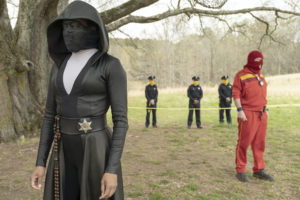


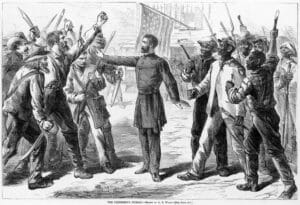

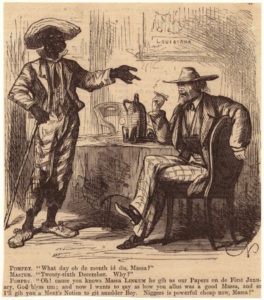
You need to be a supporter to comment.
There are currently no responses to this article.
Be the first to respond.